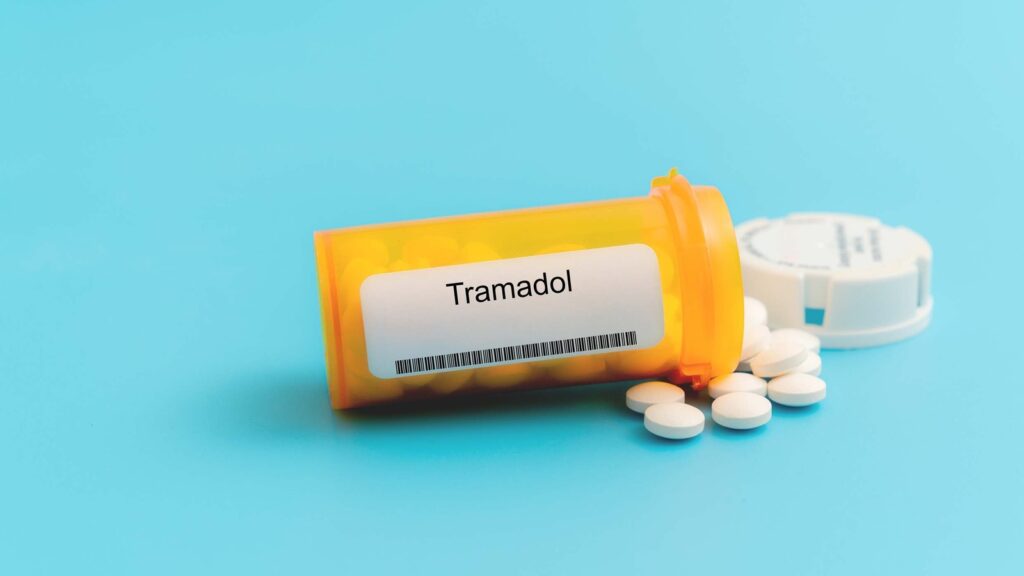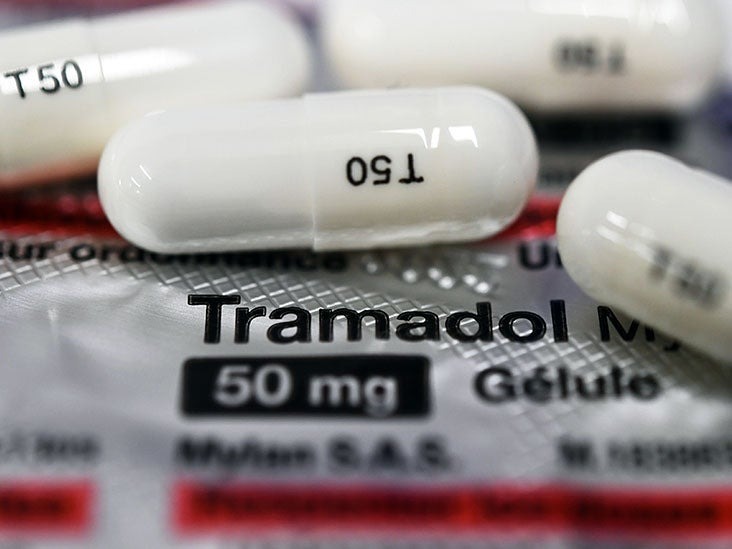Tramadol can provide relief for tooth pain, though it may not be the most suitable option. While it can help alleviate discomfort linked to toothaches, caution is necessary, especially if the pain is related to broken or decaying teeth, as Tramadol might weaken them. It’s essential to understand that Tramadol doesn’t act as a cure for tooth pain.
Nonopioid analgesics like acetaminophen and nonsteroidal anti-inflammatory drugs (NSAIDs) often prove more effective for dental pain. Seeking advice from a dentist is necessary, particularly if the toothache persists.
Considering Tramadol’s potential for abuse, it is generally prescribed for short-term use. Always follow professional guidance for a safe and effective approach to managing toothache.
What is Tramadol?

Tramadol is a medicine that helps with moderate to moderately severe pain. It works by interacting with special parts in our brain and spinal cord that deal with pain.
Think of it like turning down the volume on pain signals. Tramadol also affects certain chemicals in our brain, adding to its pain-relieving power.
How Tramadol Works in the Body
Tramadol does two main things. First, it sticks to specific parts in our body called opioid receptors, changing how we feel pain.
Second, it messes with chemicals like serotonin and norepinephrine, which helps in reducing pain signals. So, it’s like a double team that helps calm down the pain.
Common Uses of Tramadol
Tramadol finds application in various pain management scenarios. It is often prescribed for postoperative pain, chronic pain conditions, and musculoskeletal pain.
Its versatility makes it suitable for a range of situations, providing relief for different types and intensities of pain.
However, it’s essential to note that Tramadol should be used cautiously and under the guidance of a healthcare professional due to its potential for side effects and dependence.
What Are The Causes and Symptoms of Toothache?
Tooth Decay (Cavities): One of the primary culprits behind toothaches is tooth decay. When bacteria in the mouth produce acids that erode the tooth enamel, it leads to cavities, causing pain and sensitivity.
Gum Disease (Gingivitis or Periodontitis): Inflammation of the gums due to bacterial infection can result in gum disease. This can lead to toothaches, especially as the infection progresses and affects the supporting structures of the teeth.
Dental Abscess: A collection of pus in the tooth or gums due to a bacterial infection is known as a dental abscess. This can cause intense pain, swelling, and a throbbing sensation.
Tooth Fractures: Cracks or fractures in the teeth, often caused by trauma or biting on hard objects, can expose the sensitive inner layers of the tooth, leading to pain.
Impacted Wisdom Teeth: Wisdom teeth that don’t have enough space to emerge properly can become impacted, causing pain, swelling, and pressure on adjacent teeth.
Symptoms Associated with Toothache
Sharp or Throbbing Pain: Toothaches often manifest as sharp, stabbing, or throbbing pain in the affected tooth or the surrounding area.
Sensitivity to Hot or Cold: Tooth sensitivity to hot or cold temperatures is a common symptom, indicating potential issues with the tooth enamel or nerves.
Swelling and Redness: Inflammation of the gums or the formation of an abscess may result in visible swelling and redness in the affected area.
Bad Breath or Unpleasant Taste: Infections associated with toothaches can lead to bad breath or a persistent unpleasant taste in the mouth.
Difficulty Chewing or Biting: Toothaches can make it uncomfortable or painful to chew or bite down on food.
What are the Most Effective Pain Management Techniques for Relieving Toothache Discomfort?
Saltwater Rinse: Gargling with warm saltwater helps reduce inflammation and cleanses the mouth, providing temporary relief from toothache.
Clove Oil: Clove oil has natural analgesic and antibacterial properties. Applying a small amount to the affected area can numb the pain and fight infection.
Ice Pack: Using an ice pack on the outside of the cheek can help numb the pain and reduce swelling associated with a toothache.
Elevation of the Head: Keeping the head elevated, especially while sleeping, can minimize blood flow to the head and alleviate pressure, reducing the intensity of the toothache.
Avoiding Trigger Foods: Steering clear of extremely hot, cold, sweet, or acidic foods can prevent further irritation to the affected tooth.
Pain Relievers
Acetaminophen (Tylenol): A non-prescription pain reliever, acetaminophen helps reduce pain and fever. It’s considered a safer option for those who cannot take nonsteroidal anti-inflammatory drugs (NSAIDs).
Nonsteroidal Anti-Inflammatory Drugs (NSAIDs): Common over-the-counter NSAIDs like ibuprofen (Advil, Motrin) can effectively reduce pain and inflammation associated with toothaches. They work by blocking certain chemicals in the body that cause pain and swelling.
Prescription Pain Medications: In severe cases, dentists may prescribe stronger pain medications, such as opioids, for short-term use. These should be used strictly under professional guidance due to their potential for side effects and dependence.
Topical Anesthetics: Over-the-counter gels or ointments containing benzocaine can be applied topically to numb the affected area and provide temporary relief.
Can Tramadol Be Used for Toothache?

Tramadol, a pain medicine, might be given for severe toothaches when other treatments don’t work well. Dentists decide if it’s a good idea based on how bad the pain is and the person’s health.
How Tramadol May Provide Relief
Tramadol works by changing how the body feels pain. It can make the pain less intense by affecting certain parts in our brain. This helps people feel better when they have a really bad toothache.
Considerations and Precautions
Short-Time Use: Tramadol is usually only given for a short time to avoid problems like getting too used to it. Always follow what the dentist says about how much and for how long to use it.
Different for Everyone: Not everyone reacts the same way to Tramadol. How well it works or if there are side effects can depend on things like age and other medicines being taken.
Be Careful with Bad Teeth: If the toothache is because of a broken or bad tooth, Tramadol might not be the best choice. It could even make teeth weaker.
Not a Fix: Tramadol doesn’t fix the real problem causing the toothache. It just helps with the pain. It’s important to see a dentist to figure out what’s really going on with the teeth.
Ask a Doctor First: Before using Tramadol for a toothache, it’s important to talk to a dentist or doctor. They can decide if it’s the right choice based on the situation and make sure it’s used safely.
FAQ
Which painkiller is best for dental pain?
For dental pain, nonsteroidal anti-inflammatory drugs (NSAIDs) like ibuprofen or acetaminophen are commonly recommended by dentists for effective relief.
What kind of pain can tramadol be used for?
Tramadol is an opioid analgesic used to manage moderate to moderately severe pain. It can be prescribed for various types of pain, including dental pain.
Which painkiller is used in dental pain?
Commonly used painkillers for dental pain include NSAIDs such as ibuprofen and acetaminophen. Dentists may also prescribe stronger medications if needed.
What is the fastest relief for toothache?
The fastest relief for toothache often involves over-the-counter pain relievers like ibuprofen or acetaminophen. Additionally, applying a cold compress and avoiding trigger foods can provide quick comfort.
What is the strongest antibiotic for tooth pain?
Amoxicillin is commonly prescribed for tooth pain, as it effectively targets bacteria causing dental infections. The strength and type of antibiotic depend on the specific infection and individual factors.
Will tooth pain go away with antibiotics?
While antibiotics can help manage tooth pain caused by bacterial infections, they do not address other causes like decay or fractures. Consulting a dentist is crucial for a comprehensive approach to toothache relief.
Final words
While Tramadol may offer relief for severe toothaches, it’s not always the first choice. Consideration of potential side effects, short-term use, and individual health factors is crucial.
Alternatives like NSAIDs, acetaminophen, and non-pharmaceutical options should also be explored. Remember, seeking advice from a dentist is important for a comprehensive approach to managing toothache discomfort. Always use medications as directed and prioritize dental care for a healthier, pain-free smile.

